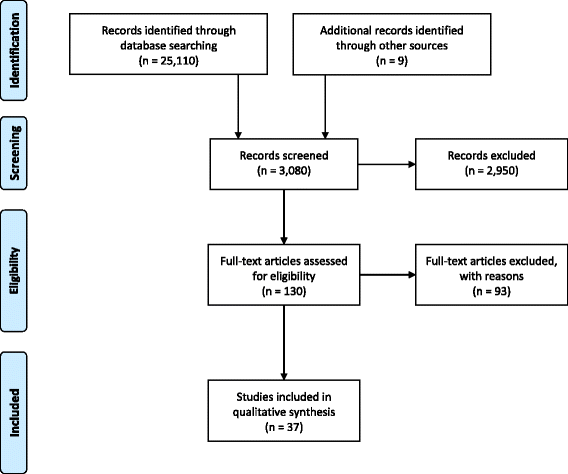A systematic overview of the literature regarding group prenatal care for high-risk pregnant women
- PMID: 28962601
- PMCID: PMC5622470
- DOI: 10.1186/s12884-017-1522-2
A systematic overview of the literature regarding group prenatal care for high-risk pregnant women
Abstract
Background: Group prenatal care (GPC) models have been gaining popularity in recent years. Studies of high-risk groups have shown improved outcomes. Our objective was to review and summarize outcomes for women in GPC for women with specific high-risk conditions.
Methods: A systematic literature review of Ovid, PubMed, and Google Scholar was performed to identify studies reporting the effects of group prenatal care in high-risk populations. Studies were included if they reported on pregnancy outcome results for women using GPC. We also contacted providers known to be utilizing GPC for specific high-risk women. Descriptive results were compiled and summarized by high-risk population.
Results: We identified 37 reports for inclusion (8 randomized trials, 23 nonrandomized studies, 6 reports of group outcomes without controls). Preterm birth was found to be decreased among low-income and African American women. Attendance at prenatal visits was shown to increase among women in GPC in the following groups: Opioid Addiction, Adolescents, and Low-Income. Improved weight trajectories and compliance with the IOM's weight recommendations were found in adolescents. Increased rates of breastfeeding were found in adolescents and African Americans. Increased satisfaction with care was found in adolescents and African Americans. Pregnancy knowledge was increased among adolescents, as was uptake of LARC. Improved psychological outcomes were found among adolescents and low-income women. Studies in women with diabetes demonstrated that fewer women required treatment with medication when exposed to GPC, and for those requiring treatment with insulin, GPC individuals required less than half the dose. Among women with tobacco use, those who had continued to smoke after finding out they were pregnant were 5 times more likely to quit later in pregnancy if they were engaged in GPC.
Conclusions: Several groups of high-risk pregnant women may have benefits from engaging in group prenatal care. Because there is a paucity of high-quality, well-controlled studies, more trials in high-risk women are needed to determine whether it improves outcomes and costs of pregnancy-related care.
Conflict of interest statement
Ethics approval and consent to participate
This review was exempt from Institutional Review Board approval as a systematic overview of published literature. While participants would have provided consent for the individual studies, no consent obtained for this review.
Consent for publication
n/a
Competing interests
BMB declares no conflict of interests regarding the preparation of this manuscript. DMH has been a part of clinical group prenatal care programs that have received funding from the March of Dimes to help establish Centering Pregnancy prenatal care but has received no salary support in that regard.
Publisher’s Note
Springer Nature remains neutral with regard to jurisdictional claims in published maps and institutional affiliations.
References
-
- Barr WB, Aslam S, Levin M. Evaluation of a group prenatal care-based curriculum in a family medicine residency. Fam Med. 2011;43(10):712. - PubMed
Publication types
MeSH terms
LinkOut - more resources
Full Text Sources
Other Literature Sources
Medical


